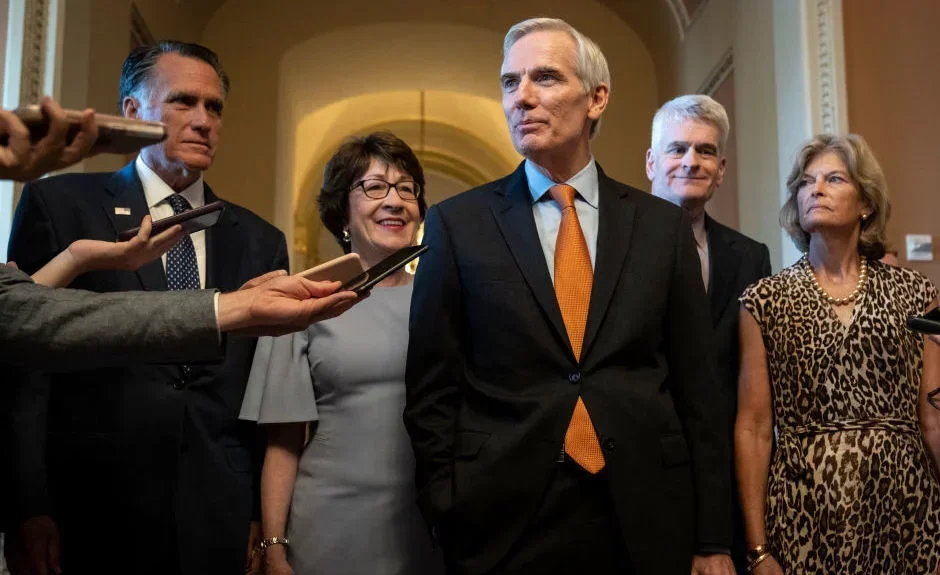In a rare display of bipartisan unity, U.S. Senators James Lankford (R-OK) and Gary Peters (D-MI) are pressing the federal Bureau of Prisons (BOP) to address what they describe as a systematic bias against Christians and faith-based programs. Their concerns focus on the lackluster implementation of the First Step Act, a landmark criminal justice reform law signed by President Donald Trump in 2018.
Christian Talk Podcast
The First Step Act was designed to reduce recidivism and improve reentry opportunities for federal inmates, partly by fostering partnerships with faith-based organizations. However, Lankford and Peters argue that the BOP has fallen short of its obligations, sidelining religious programs that have proven transformative for incarcerated individuals.
“Faith-based programs are not just a matter of religious expression; they’re an essential tool for rehabilitation,” Senator Lankford said during a press conference. “I think Jesus lives in prison because it seems like so many people meet Him while they’re there. The love of God pours out to individuals regardless of their past.”
Lankford shared stories of inmates who credited their faith for turning their lives around. He cited studies showing that participation in faith-based initiatives significantly reduces recidivism rates. “These programs don’t just change behavior; they change hearts,” he added.
Senator Peters echoed these sentiments, emphasizing the bipartisan nature of the issue. “This isn’t about politics; it’s about giving people a second chance,” Peters said. “Faith-based organizations have a long history of helping people rebuild their lives, and it’s unacceptable that the Bureau of Prisons would limit their ability to serve.”
Despite these calls to action, the Bureau of Prisons has faced criticism for bureaucratic inertia. Lawmakers have pointed to several cases where faith-based organizations were denied access to facilities or had their programs restricted. The reasons cited often include administrative hurdles or concerns about violating the separation of church and state.
Advocates argue these excuses are unfounded. The First Step Act explicitly allows partnerships with religious groups, provided participation is voluntary. “This is not about forcing faith on anyone,” said Tony Perkins, President of the Family Research Council. “It’s about offering a proven pathway to hope and redemption.”
The controversy highlights broader tensions between secular governance and religious freedoms. Critics worry that limiting faith-based programs undermines efforts to address the root causes of criminal behavior. “If we truly want to reduce crime, we need to address the spiritual and emotional voids that lead people to break the law in the first place,” said Dr. Alveda King, a prominent civil rights advocate and niece of Martin Luther King Jr.
Opponents of expanding faith-based programs argue that resources should focus on secular rehabilitation initiatives. “The government should not be in the business of promoting religion,” said an anonymous official from a secular advocacy group. “There are other ways to achieve rehabilitation without crossing constitutional boundaries.”
Supporters, however, counter that excluding faith-based programs is itself discriminatory. “The First Amendment protects the free exercise of religion,” Lankford said. “Denying inmates access to these programs is a violation of their constitutional rights.”
The debate has sparked renewed interest in prison reform and the role of religious organizations in the public sphere. Faith-based programs often rely on volunteers and donations, making them cost-effective compared to government-run initiatives. Proponents argue that these programs offer something secular alternatives cannot: a sense of purpose and moral accountability.
One example often cited is Prison Fellowship, a faith-based nonprofit founded by Chuck Colson, a former aide to President Nixon who found faith during his own incarceration. The organization has helped thousands of inmates rebuild their lives and reintegrate into society.
A 2022 study from Baylor University found that inmates who participated in faith-based programs were 40% less likely to reoffend within three years of release. The study attributed the success to a combination of moral teaching, community support, and the personal accountability instilled through religious practices.
With these findings in mind, Lankford and Peters are urging the BOP to remove barriers and fully implement the provisions of the First Step Act. They have requested a detailed report on the agency’s progress and an explanation for the delays in working with faith-based organizations.
The senators’ efforts have garnered support from a diverse coalition, including religious leaders, criminal justice reform advocates, and former inmates who benefited from such programs. “When you give people hope, you give them a reason to change,” said one former inmate who now volunteers with a faith-based reentry program.
As the Bureau of Prisons faces mounting pressure to act, the broader implications of this debate extend beyond prison walls. The conflict touches on fundamental questions about the role of faith in public life, the balance between church and state, and the enduring power of redemption.
For now, Lankford and Peters are determined to see the promises of the First Step Act fulfilled. “This is not just about policy,” Lankford concluded. “It’s about people—people who deserve a second chance, people whose lives can be transformed by the hope that faith provides.”
